- Home
- Sarah Hawkswood
The Lord Bishop's Clerk Page 6
The Lord Bishop's Clerk Read online
Page 6
The body, a shapeless mass beneath the dark cloth that had hidden its horrors from the worshippers, lay incongruous in the tidy splendour of the choir; it was a thing of no worth, discarded in haste. Serjeant Catchpoll uncovered the corpse. It was both repellent and impersonal, lying as it did face down. There were no staring, accusing eyes, but the remains of the back of the head were a grim mess of splintered pale bone, blood and brain matter. The two sheriff’s men stood gazing thoughtfully for some time at what had so recently been Henri de Blois’s clerk, each drawing his own conclusions. Neither was squeamish. Bradecote squatted down on his haunches and disturbed the tatters of vellum with a finger.
‘What do you make of these, Serjeant?’
‘Charred vellum, my lord,’ answered the older man, woodenly.
‘Don’t try my patience, Catchpoll. I am as tired as you are, and did not ask for this task. However, I will do my best, and expect no less from you.’ He paused. ‘Do I make myself clear, Serjeant?’ The tone brooked no argument.
‘Aye, my lord, very clear.’ Unspoken animosity crackled between them.
‘Well, then. What does the charred vellum tell us?’
‘Either the clerk was killed in the process of burning some very private material, using the candle which I extinguished when I covered the body,’ he pointed to the solitary candle on the altar steps, ‘not wishing to burn both the blanket and corpse together, or he was killed so that the material could be destroyed. The second reason is, of course, the answer.’
‘Why?’ Bradecote stood up, frowning, and Catchpoll, noticing the expression, smiled unpleasantly.
‘Firstly, because the documents have been totally burnt, not removed. Secondly, because a man does not read or burn letters while lying face down on the floor, and thirdly,’ Catchpoll paused for a moment for effect, ‘because he did not die here.’
‘Fair enough,’ said Bradecote equably, thus successfully ruining Catchpoll’s moment of triumph. ‘The murderer may have read the documents and then decided to destroy them, rather than risk being found with them, but I agree that it seems unlikely that the clerk burnt them himself. It does tell us something about the murderer, of course.’
Catchpoll looked mildly interested, but said nothing.
‘The murderer can read, Catchpoll.’
Serjeant Catchpoll sniffed. ‘That may well be so, my lord, although they could have been sent to commit the murder and told to burn any documents, even if they could not tell what was in them. In some ways it is a cleverer thing to do, for if caught, the killer can reveal nothing of what was written. Very handy if it implicated someone in dark dealings.’
It was a fair point, and Bradecote acknowledged it. ‘And I assume that you think the body was moved because of the stains on the scapular?’
Catchpoll regarded Bradecote with narrowed eyes. The man was quicker than he had expected. This fact did not necessarily please him.
‘As you say, my lord.’ Catchpoll knelt beside the corpse, grunting as his ageing muscles complained, and lifted the back of the scapular, which was marked some way from the top by a large, dark and drying stain. He shook his head slowly, and spoke almost to himself.
‘The blow which broke the skull could not have marked the cloth so far down the back like this, nor with little trace above.’ Catchpoll outlined the limit of the stain upon the stone slabs with his finger. ‘You can see the way the blood has gathered on the floor, and not as much as if it happened here, nor with the splashes you’d expect. No, this man was killed somewhere else and dragged here on his own scapular. The stain matches. I’d swear he was not long dead, though, because of the amount of blood soaked in the cloth.’
Bradecote nodded. He had seen enough violent death to know how much blood would come from so violent and fatal a blow. He formed a mental picture of the murderer pulling the back of the scapular up to the dead cleric’s shoulders and rolling the body onto its back. Dragging it by the scapular would be easy enough over the stone floor, and would prevent an obvious trail of blood from the scene of the act to the altar.
‘That raises two new questions. Where did the murder take place, and was the body left in the penitential pose as a disguise to casual observers, or for a reason?’
‘The murder must surely have taken place within the church, my lord, but I couldn’t make a judgement on the second point.’
‘No matter. That might come to light later. Let’s hunt around for signs of our victim’s last journey.’
The pair split up, Catchpoll taking St Eadburga’s chapel in the south transept, and Bradecote turning his attention to the north transept and then the Lady chapel. The serjeant met him there some time later.
‘Nothing to be seen on my side, my lord, though I haven’t searched the nave yet. It seemed an unlikely place, and the light is failing.’
‘Mm,’ replied Bradecote distractedly. ‘What do you think about this?’ He pointed to a darkened crack between two floor slabs. It too, was losing definition in the deepening gloaming.
Catchpoll squatted down slowly, and pressed his finger along the crack. It came away with a dark, possibly brown, mark. He sniffed his finger tip, meditatively.
‘I suppose it could be blood, but there’s little enough of it. I’d be happier with flecks of blood and suchlike. Whoever killed the clerk smashed him good and hard with something heavy to do that sort of damage to the skull, perhaps more than once, and it was a blunt object, not something slicing. There would assuredly be signs, aye, and ones that a murderer in a hurry would not notice.’
He sat back on his heels and looked around him. Bradecote was put forcibly in mind of a dog on the scent, and forbore to say anything. Catchpoll certainly had plenty of experience of scenes of crime, and should pick up on things that he, as a complete novice, would miss. Bradecote took stock of the man. ‘Grizzled’ was the best description of him, in both mien and appearance. His hair was greying and straggling almost to shoulder length, and his stubble-beard showed even more white. The thin lips were merely a gash across the beard, and there were deeply etched lines running from his nose, which had been broken in the past, to his mouth. The eyes were deep set beneath sparse but beetling brows, and crows’ feet creased their outer aspect. Everything about him proclaimed the hard bitten professional who knew just how he wanted to go about things, and was not about to change. Hugh Bradecote stroked his own chin meditatively, and realised that he must also present a rough appearance. There was two days’ worth of dark stubble on his cheeks, dried blood from a minor head wound matting the lock of hair that fell forward over his frowning brow, and grime, from a long day in the saddle, all over him.
After a short while Serjeant Catchpoll grunted again and got up, easing his back as he did so.
‘Well then, I’d say we have our place, my lord. If you look carefully at the stone you’ll see a discolouration there.’ He indicated a patch which, to Bradecote, looked no more than a change in the shade of the stone itself. ‘That was noticed by our killer and wiped up. The edge is a smooth sort of line, not jagged from a splash. There’s much smaller marks around and about, as I hoped, but in this light they’re tricky to see.’
He stopped before the small altar, and his face performed a contortion that Bradecote interpreted as indicating deep thought. Catchpoll, he decided, could convey a remarkable amount without the need for speech.
‘The clerk was hit from behind. We know that from the position of the wound. I would hazard a guess that he was here,’ he edged a little closer to the altar, ‘and fell forwards when the blow was struck.’
‘How do you work that out?’ Bradecote was intrigued.
‘The altar cloth is slightly askew. The religious like everything just so, and would not have left it like this. I reckon our man fell forward, and though such a blow would be fatal almost instantly, his arm stretched out as if to prevent the fall, without him thinking. He just clutched at the cloth, but was no longer conscious to grasp it proper.’
Bradecote
was genuinely impressed at the serjeant’s powers of observation. He could not conceal his admiration for such deduction, and remarked as such.
Catchpoll gave an indulgent smile, which effectively doused the small spark of amity which had been kindled between them. Without so much as a word, the serjeant had asserted his place as the professional, forced by circumstance into partnership with an amateur. ‘You can play at this as long as you like,’ said the look, ‘but just you let me get on with the real work.’
Bradecote tried to appear as though this had been lost upon him, but he knew Catchpoll was not fooled. He rubbed his eyes and yawned, suddenly weary beyond belief.
‘We’ll achieve no more tonight. Make sure that a man-at-arms is left on watch at the entrance to the guest hall. We don’t want any sleep-walkers.’
‘Indeed so, my lord. I’ll set three of ’em to watch, the first up until Lauds. No one will get past.’
‘Good. I am for my bed. We will begin again after Prime. Goodnight, Serjeant Catchpoll.’
‘Goodnight, my lord.’
Bradecote strode off, determined not to let his shoulders droop with fatigue, though he had been up since the dewy summer dawn, and his stomach was reminding him, with unpleasant pangs, that he had not eaten since they had set off in the morning. Outside the church it still seemed warm, although the sun was very low and would soon be no more than a smudged, pink memory along the western horizon. The air was heavy with summer smells, and bats sped and dived and soared between the buildings, emitting barely audible squeaks. It was a time of day that Bradecote liked, though he was too tired and bruise-stiff tonight to appreciate it properly.
He was thinking of his bed and heading for the guest hall, but suddenly bethought himself of the abbot, who would desire to know what had been achieved thus far. ‘Keep ’em sweet,’ the lord sheriff had said. Heaving a sigh, he altered his course and went first to the abbot’s lodgings, and only when over the threshold wondered if the Benedictine had sought his bed, with the night offices only a few hours distant. Fortunately, Abbot William was too overset to seek his couch, and Bradecote found him sitting in doleful silence. Their conversation was brief and largely one-sided. The abbot nodded frequently, but was only half attending. In the course of his briefing, Bradecote remembered to ask the murdered clerk’s name. The sheriff’s officer left after a short while, feeling his duty done.
He passed at last into the guest hall with a nod on the way to the man-at-arms by the stables beyond, who made every effort to look alert, and not as if he had been leaning sleepily against the wall. Once his eyes had adjusted, Bradecote sought out his bed without recourse to a rush-light. Ablutions could wait for the morning.
The Second Day
One
Despite the weariness of his body, and perhaps because of its aching complaints, Hugh Bradecote awoke early, and lay for some time, gazing without seeing at the roof beams in the cobwebbed gloom above him. He was reviewing everything that had happened since his arrival, which seemed so much longer ago than only the previous evening. He had arrived simply a manorial lord giving service to his overlord, and now suddenly found himself an under-sheriff. That, however temporarily, made him an officer of the crown as well as de Beauchamp. The sheriff had selected him from a mixture of weariness and mischief, as he well knew, but even in jest his overlord would not have picked a fool. So here he was, faced with a murder, and no clear indication of how to proceed, beyond letting Serjeant Catchpoll ferret around. That was not enough. He must think, clearly and logically, about exactly what they had discovered, and what linked together. If Catchpoll could do this, Bradecote told himself he was quite capable of doing it too. After all, it was surely not some form of necromancy.
He cleared his mind and began again, considering the victim, and how he was found. There was still a question in his mind about the positioning of the body. Had it been left in the Lady chapel it might not have been discovered until the next day, possibly after the murderer had left about their business. Was it that the murderer was making a point, something about the clerk owing penance? He could not see how the problem could be resolved without the motive of the killer. They did at least know where the murder had taken place, and how, although the exact nature of the weapon was unknown. There was also the matter of time. The man had been alive at Vespers and dead by Compline, only a couple of hours later, but they needed to find out if anyone had seen him during that period. Perhaps he had been in the refectory or at the abbot’s table; he must check that. If he had been at neither, then what had been more important than filling his belly?
It was almost impossible that a stranger had walked into the church and committed the murder, and it was certainly none of the townsfolk who had attended Compline. He could not see the old lady’s walking stick as a murder weapon. He smiled to himself. No, it had been someone within the enclave. How many of the brethren could be vouched for during the entire period? Bradecote groaned, and offered up a fervent prayer that the majority had chosen to be sociable, for the thought of interviewing upward of thirty choir monks, and Heaven knew how many lay brothers, and at length, left his brain reeling. There would also be the guests and their servants, not forgetting the masons. Once the list of suspects had been reduced to reasonable proportions, he supposed he had best start by interviewing the master mason who had discovered the body. Having made his plan of action he arose to break his fast, and found his presence had a very dampening effect upon the guest hall occupants. Hugh Bradecote was an open sort of man, quite serious, but not without humour, and to be greeted with cautious looks and a cessation of conversation as people looked cautiously at him over their bread, was a new experience for him. He consoled himself with the thought that he must look as if his new role suited him, and so it was a cheerful and apparently confident acting under-sheriff who soon afterwards strode purposefully, but with a long-legged grace, across the abbey courtyard to where Serjeant Catchpoll was in quiet conversation with Gyrth, the man-at-arms, who was reporting a peaceful watch.
Catchpoll turned at the sound of the footsteps, and watched his unwelcome superior stride towards him. Bradecote was a tall man, fighting fit but inclined to the lean, and Catchpoll judged him to be but a few years over thirty, but the watchful expression that was natural to him made him appear older. Last night, the situation had kept his features serious, but this morning he was in good humour, and the vestige of a smile lengthened the line of his mouth. He looked younger, and far too keen for Catchpoll’s liking.
‘You’ll be all right if there’s any old crones to speak with,’ ventured Gyrth, grinning.
‘You keep your tongue still in your head, lest his lordship hear you,’ growled Serjeant Catchpoll, his thin lips scarcely moving.
Gyrth shut up, but the broad grin remained. It had been the one light moment during the hunt for the outlaws of Bredon Hill. Catchpoll, conscious of his position, and with the sheriff himself on hand, had made his enquiries en route with an unusual degree of high-handedness. It had been unfortunate that he had sought information from an old woman who had not responded in the manner he expected. She had looked upon him with a rheumy eye and a curled lip, as if he were of no more importance than a stray cur, and had turned away without even so much as a word in reply.
The lord Bradecote had been in the forefront, in conversation with the sheriff, and had urged his horse forward before Catchpoll could harangue the old harridan. He had leaned forward, his arm nonchalantly across the bow of his saddle, and spoken to the woman in unaccented English, gently, and with a singularly charming smile. One moment there had been a cantankerous old witch keen only to see the back of them, and suddenly she was transformed into a beaming, grandmotherly figure, who bobbed a creaking curtsey, smiled up at Bradecote, almost blushing, and gave the desired information without demur. When Bradecote thanked her she simpered and darted back into her cottage, only to reappear a moment later with a couple of dubious-looking honey cakes in her gnarled grasp. She had pressed them upo
n him, much to his embarrassment, and to the sheriff’s loud and obvious amusement. Catchpoll had not been as entertained, especially when the sheriff had suggested he try the lord Bradecote’s methods on the next peasant woman they met, and see if she would feed him too.
The serjeant, recalling the incident as well as Gyrth, cast the memory aside and schooled his features into the semblance of a respectful greeting.
‘Good morning, my lord,’
Catchpoll had, thought Bradecote, the self-satisfied look of a man who had been experiencing the joys of the day for some considerable time.
‘Gyrth says that nobody left the guest hall after you went to bed.’
Gyrth nodded, confirming the pronouncement, with the slightly fatuous smile still fixed to his lips. Catchpoll continued, ‘The lord sheriff is not yet about. Also, the lord abbot had the corpse removed to the mortuary chapel last night, my lord. I gave permission, because I did not think you would have further need of seeing the body as it lay, and it would disrupt the brothers at Lauds.’ He made it sound as if the feelings of the brethren mattered to him, though Bradecote knew that they did not. ‘I did not wish to disturb you after you had retired, my lord Bradecote.’ Now he added equally insincere solicitude for his superior’s rest.
The serjeant assumed the manner of the loyal subordinate who had no wish to burden his superior with unnecessary trifles, and Bradecote swore inwardly. Catchpoll was quite correct in his assumption that the removal of the body was in order, but he had shown the Abbot of Pershore that he was able to take important decisions alone, and had shown up Bradecote’s failure to see that the problem would arise.

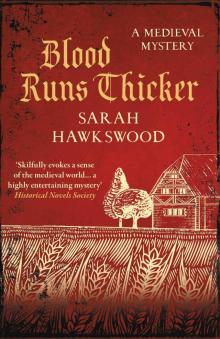 Blood Runs Thicker
Blood Runs Thicker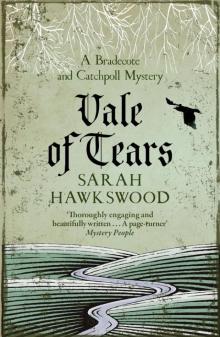 Vale of Tears
Vale of Tears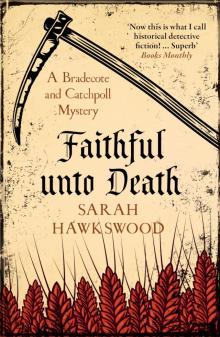 Faithful Unto Death
Faithful Unto Death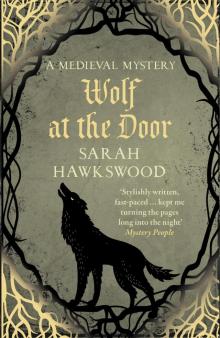 Wolf at the Door
Wolf at the Door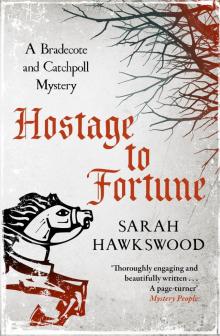 Hostage to Fortune
Hostage to Fortune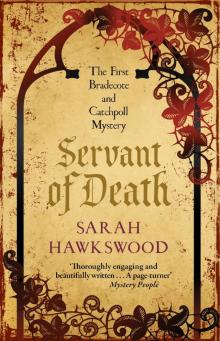 Servant of Death
Servant of Death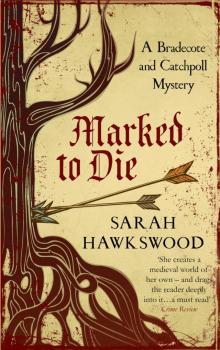 Marked to Die
Marked to Die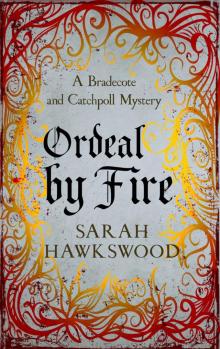 Ordeal by Fire
Ordeal by Fire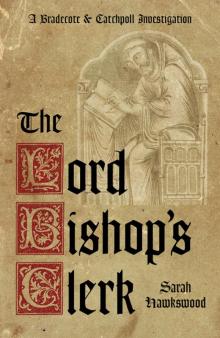 The Lord Bishop's Clerk
The Lord Bishop's Clerk